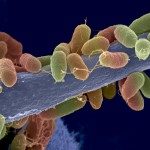Link to Pubmed [PMID] – 24711569
Infect. Immun. 2014 Jun;82(6):2649-56
Allogeneic hematopoietic stem cell transplant (HSCT) recipients are at high risk for invasive aspergillosis. Whereas adoptive immunotherapy transferring donor-derived anti-Aspergillus TH1 cells has been shown to be beneficial for HSCT recipients suffering from invasive aspergillosis, little is known about the impact of commonly used immunosuppressants on the functional properties of anti-Aspergillus TH1 cells. Anti-Aspergillus TH1 cells were coincubated with different concentrations of methylprednisolone, cyclosporine (CsA), mycophenolic acid (MPA), the active component of mycophenolate mofetil, and rapamycin. Immunosuppressants were tested in concentrations reflecting common target levels in serum and in significantly lower and higher concentrations. Apoptosis of anti-Aspergillus TH1 cells, as well as proliferation and production of gamma interferon (IFN-γ) and CD154 upon restimulation, was evaluated in the presence and absence of immunosuppressive compounds. All dosages of CsA, MPA, and methylprednisolone significantly decreased the number of viable anti-Aspergillus TH1 cells in the cell culture, which was due partly to an impaired proliferative capacity of the cells and partly to an increased rate of apoptosis. In addition, CsA significantly decreased the number of IFN-γ-producing cells and had the highest impact of all immunosuppressants on IFN-γ levels in the supernatant. CsA also significantly decreased the expression of CD154 by anti-Aspergillus TH1 cells. Variant dosages of immunosuppressants exhibit particular effects on essential functional properties of anti-Aspergillus TH1 cells. Our findings may have an important impact on the design of clinical trials evaluating the therapeutic benefit of anti-Aspergillus TH1 cells in allogeneic HSCT recipients suffering from invasive aspergillosis.

